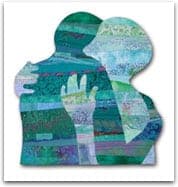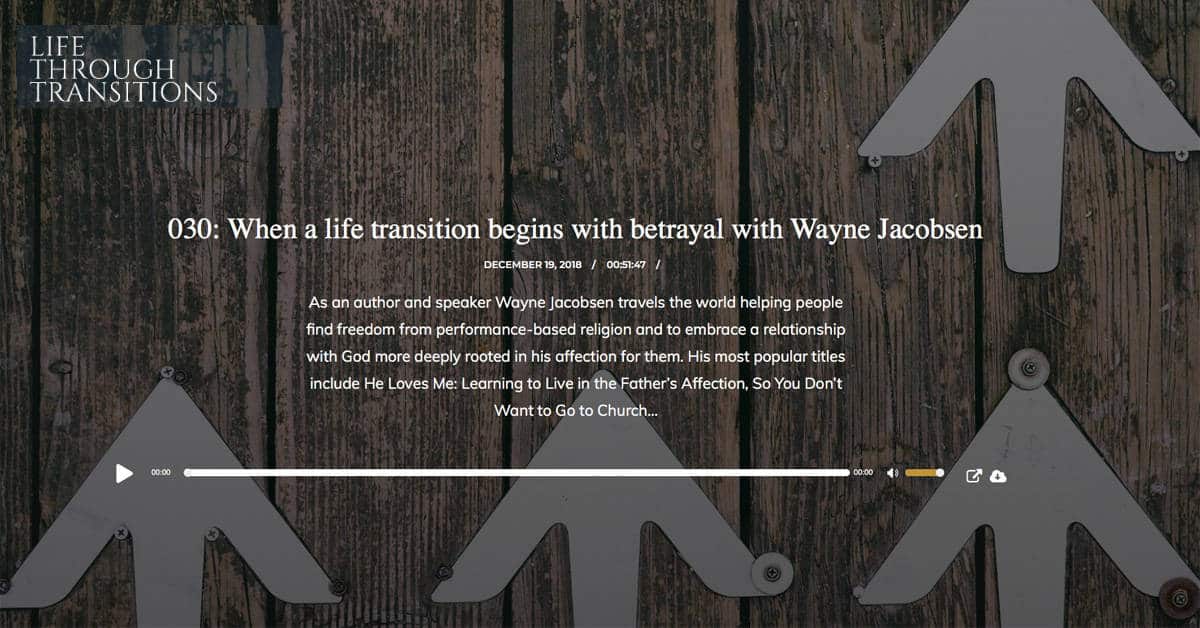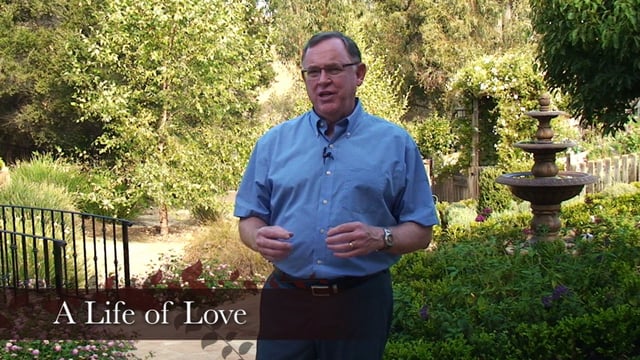By Wayne Jacobsen
Living Loved • Spring 2012
The world does not need one more example of people who claim to be Christ-followers while they blow up close friendships for whatever personal gain they may seek. We have too many already.
Unfortunately, Christians have a far greater reputation for self-serving than they do for self-sacrifice. Church history is littered with successions of church splits, doctrinal distinctions that allow one group to look down their noses at another, gossip, and dishonest business practices.
What a sad heritage indeed when the only thing Jesus asked of us is that we would love each other in the same way he loved us so that the whole world would know who he is! We failed that mission miserably. We failed it early. And we continue to fail it often.
Paul and Barnabus couldn’t even find a way to go on a second journey together to spread the gospel in the world. They ended up in a “violent disagreement” over John Mark that shattered their friendship and unfortunately set a tone that has endured for 2000 years. There are even numerous examples in history of both sides in a war praying to the same God to help them slaughter their enemies.
If you wonder why authentic, caring community with other Christfollowers remains so elusive, it’s because Christianity, as a religious system, merely offers humanity another tool to serve their own ambitions. Many, especially so-called leaders, have never learned to live with the same selfsacrificing love that allowed Jesus to engage others beyond his own personal needs. They view people around them either as those they can exploit if they are cooperative, or must subvert if they dare challenge or question.
We will love well in the world only when we learn that the essence of love is in laying down our lives for others, not using them for our own needs. We will never understand that freedom until we know how loved we are by God.
Valuing Relationships
I’ve met a lot of people who want to be famous writers, artists, or musicians, others who want to change the world through media, political action, or power encounters. But I don’t recall ever meeting anyone whose life ambition was to be a good lover of people. And yet, that’s how Jesus seemed to live his life. He didn’t start any projects, rush around to planning meetings, or plot world-altering strategies. He simply loved the people his Father put before him and the kingdom of God made its way into the world.
Maybe that’s why he told the disciples that if they would love like he did the whole world would get to see who he is. It’s the one thing Christians haven’t done for 2000 years. It’s amazing how easily Christians discard personal relationships in the pursuit of other things they consider more critical. Whether it is doctrinal purity, political power, personal acclaim, or behavioral conformity, anything we put above loving the people God puts before us will only make us more a part of the world system that offer human sacrifices to the god of our self-expedience.
Why do we do it? Because we have no idea how deeply loved we are. One can even teach the so-called “love message” and yet still throw someone under the bus at the first sign of trouble. If you’re willing to do that to someone else to save yourself, you don’t know Jesus well. Learning to live loved is the fruit of a growing relationship with him. It seems to take significant time, and most of our theological studies and religious efforts are not helpful in that process. I was a passionate practitioner of a religion called Christianity for over forty years before I had an inkling of how much the Father loved me. I was so busy trying to accomplish something great for him that people were often a means to my ambition, not the object of my affection.
As I grow in my understanding of his love for me it changes the way I see others around me, including complete strangers. I’ve come to appreciate that the greatest gifts we are given in this life are the people we know and the friendships that grow out of those relationships. Ask any person on the verge of death and they will swear it is so. Everything else is secondary.
Unfortunately, not everyone shares the same passion for relationship, and if you’re going to love deeply in this world you will also get hurt often. You will be taken advantage of. You will be mistreated and often used. Our world is relationally challenged, which is why there are so many Scriptures that help us deal with relational breakdowns.
If you want to love like he loves, you will have to learn how to negotiate the painful realities of broken relationships and even find joy even in the process. Living loved by him and loving others freely around you is the greatest adventure you will ever know.
Handling Betrayal
We learned at a very young age that the same people who might praise us one day, can easily reject us the next. I wonder how many people who shouted, “Blessed is he who comes in the name of the Lord” as Jesus rode into Jerusalem, also shouted, “Crucify him,” only five days later.
Jesus knew that for many love would often take second-place to self-interest. I’m not talking here about momentary failures or misunderstandings that can temporarily derail a friendship. We all see things differently, and can disappoint each other without knowing it. But people of honor will work through those moments to find a mutually satisfying resolution with love and respect. Betrayal rises out of consistent patterns of exploitive, deceptive, or destructive behaviors.
For the past ten years I’ve begged every friend I’ve done business with, to resolve whatever difficulties might arise inside the friendship. I promised if they were unhappy, I’d make sure they walked away with a smile before I did. People easily agree to the concept, but at the first sign of conflict some will betray the friendship and seek whatever means they can to force their will. And almost all of them claim God’s leading even when it involves outright lying and gossip. When I’ve asked them to submit their concerns to other believers of their choosing, they refuse. That’s when you know they are not concerned with a fair solution, but only one that serves them.
Feeling used by another human being is one of the most painful realities of living in a broken world. I’ve been surprised by it on more than one occasion and am left wondering why people can’t put affection and truth ahead of duplicity and greed.
Perhaps it simply asks more of people than they have to give. In his book, His Excellency George Washington, Joseph J. Ellis tells us that our nation’s founders rejected the idea of a pure democracy knowing it would ultimately fail. “During the war Washington had learned, the hard way, that depending on a virtuous citizenry was futile, for it asked more than human nature was capable of delivering.” And what was that? “Making voluntary sacrifice the operative principle of republican government had proved to be a romantic delusion. Both individual citizens and sovereign states required coercion to behave responsibly.”
Without Christ that is certainly true. Often with Christ it is still true. I’ve spent a lot of time of late with people who have been through incredible acts of betrayal, whether it is an unfaithful spouse, abusive pastors, or even dishonest business associates. There’s nothing worse than finding out that a close friend has decided they have more to gain by betraying you than by remaining faithful.
Rather than be overrun with pain, however, Jesus told us to consider ourselves blessed when we’re lied about or excluded. And if we don’t appreciate it, we will only treat others the way they treat us and perpetuate the cycle of pain. No, that isn’t easy, but it is nonetheless the truth.
One thing that helps me is not to take it personally. No one deserves to be betrayed by someone who postures themselves as a close friend. Betrayal at its heart is not about you, it’s about weakness in the other person’s soul. Hurting people, hurt people. That’s as true a statement as I know. Betrayal is an assault against love itself and only shows how lost the betrayer is in his own pain.
Of course, none of us can endure betrayal on our own. We have to land squarely on the lap of a loving Father, pouring out our hurts and disappointments, knowing he is able to care for us even beyond the unfaithfulness of others. As we find healing and rest in his love, which may take weeks or months, then it will become clear how he wants us to respond.
Sometimes he wants you to stay in the relationship and love them past it. At other times he will want you to distance yourself from destructive people, especially those who violate your boundaries. Loving others doesn’t mean you have to let them walk all over you. He will show you how to lay down your life in trust that he will resolve things in far better ways than you can.
Finding Forgiveness
“Unforgiveness is like drinking rat poison while waiting for the rat to die,” is a common, but wise expression.
Our unforgiveness does not impact those who have hurt us. It doesn’t even protect us from further hurt. It merely leaves power in the hands of those who cause damage in the world. Forgiveness is the healing salve in broken relationships. It does not excuse someone else’s behavior; it merely frees their victim from the ongoing pain of their actions and the desire to pay them back. By doing so it opens the opportunity for us to find healing beyond the pain, and the freedom to move on with God’s further work in our lives.
But forgiveness is not just a choice of our will; it is a process. It begins by bringing our hurt and pain to Father so that his love can heal us from what others have done to damage us. This may take a few weeks or even years, depending on how deep the betrayal, but don’t stop short until his freedom comes to reign in your heart. Somewhere along the way, as he untangles the pain and leads us out of it into greener pastures, you’ll find yourself able to release the other person from your judgment and entrust them to God.
You’ll know forgiveness has had its work in you when you no longer feel the angst in your stomach when you think of the one who hurt you. You’ll find God’s love more powerful than the most destructive intentions of others. In the end, we learn to forgive as we understand how much we need God’s forgiveness ourselves. When I have a difficult time forgiving someone else over a long season, it has helped me to ask Jesus what it is about his forgiveness that I don’t yet know for myself. The more I understand his forgiveness for me the easier it becomes to give it away to others.
What I love about forgiveness is that it is a unilateral process. It doesn’t depend on the other person owning their failure or asking me for it. My forgiveness of others is transacted with God alone. I free them to God. And, as much as God allows, I take my liberty from their continuing influence on my life. Forgiving can allow an amiable relationship, but it will be a distant one. You can keep the peace with them by not bringing up the past, but the friendship will not heal.
Nothing in forgiveness heals the relationship, nor does it give respect back to those who were hurtful. Many have been taught that true forgiveness erases the past and lets us start over. It does not. While I remove my judgment from them, their actions may still expose their true nature. While I can continue to love them, it is love with eyes wide open, aware of the deep inner torment that they live with and their willingness to thrust it upon others in an instant.
A Heart for Reconciliation
Forgiveness alone, however, does not fulfill the Father’s greatest desire. Broken relationships in his family break our Father’s heart. It results from sin twisting us and our competing for things he has not given. Redemption always holds out hope for reconciliation– even with those people who have wronged us most. God’s ability to restore friendship between estranged children of his, is one of the greatest fruits of his work in humanity.
In the past four months I’ve had the blessing of being part of two reconciliations of important friendships that were cut off in days of pain and betrayal. Both separations lasted over 15 years and have now been healed. I wish it hadn’t taken so long, but this isn’t a process we control. What absolute delight it was to work through the pain, misunderstandings, and confusion that caused the separation, and celebrate the grace of God that triumphs in all of us, even beyond our own brokenness and failures!
While forgiveness is a unilateral process, reconciliation is a bilateral process where the relationship is healed. This can only happen when both parties are ready to sit down and honestly explore each other’s story with a spirit of compassion and humility. It cannot be forced and can only happen when all parties truly value the relationship over any other agenda. Reconciliation embraces a love greater than our need to be vindicated.
This, too, is a work of Father we respond to, and not our responsibility to make happen. Until each heart is prepared to truly listen to the other’s story, laying aside own assumptions and judgments, admitting mistakes, caring about each other’s pain, and mitigating any way we can the damage we caused. That’s what allows friendship to be renewed.
Do I Trust Them Again?
Does reconciliation restore trust? I’m asked that question almost every time I discuss it. Of course not!
Reconciliation does not require us to trust again. That’s a different process. While it will allow us to love them again, reconciliation does not restore trust. The sad truth is that while it takes years to build trust it only takes a minute to destroy it. Once destroyed by abuse or betrayal, trust has to grow again even after the friendship is renewed. You can forgive a spouse who abuses you, and even find reconciliation as he owns his failure, but reconciliation doesn’t change people. If we simply trust someone who has not yet changed, we only set ourselves up to be exploited again.
Reconciliation doesn’t make you stupid or gullible. Cheap promises are not a substitute for transformation. Trust, once violated, can only be won back by the demonstration over significant time that God has dealt with their inner darkness, and they have come to value the relationship above their own self-interest.
You don’t trust a stranger, and you don’t re-trust someone who has betrayed you even after you’ve been reconciled. We are never told to trust someone beyond our assurance that they will lay down their life for us. Trust is the fruit of an ever-deepening relationship of mutual love and respect. One of the greatest joys in human relationship is to engage relationships of love and growing trust that endure the test of years of shifting circumstances. It is a journey worth cultivating, and one worth protecting. Why anyone would trade that joy for any temporal gain is beyond me. They are giving up more than they know.
The Sweet Smell of Death
I recently spent some time in New Zealand with a friend of mine named John Beaumont, he challenged me to look at a Scripture differently than I’d ever interpreted it before. He told me that a passage in Second Corinthians that has been misinterpreted for centuries. This is where Paul writes that we are a fragrance to those being saved, and to those that are perishing. “To the one we’re a smell of death; to the other the fragrance of life.” (2:16)
John explained that most people think that we are a smell of death to the world and fragrance of life to the church, but the construction of the verse won’t support that conclusion. We are actually a smell of death to those being saved, and a fragrance of life to the world. How can that be? My confused look caused John to go on.
“The smell of death for the believer, is one where someone has been crucified with Christ and their ‘life is now hidden with Christ in God (Col 3:3),” John concluded. Is there any greater fragrance than someone whose wounds, ambitions, preferences, and agendas have been swallowed up by God and who now lives in the simple power of loving and caring for others? The aroma of a life that no longer needs to find its own identity, force its own will, or prove itself, offers a garden of rich possibilities in their daily interactions.
Those who are loved well by Father, will love well in the world. To be a lover of people is the one thing every one of us can do each day that will do more to change the world than any personal achievement we aspire to. Loving those whom God puts before–our spouse, children, co-workers, neighbors, and even strangers–is where real joy is found and where the kingdom work is really done.
Each time you offer a greeting, show an interest, serve a need, offer a listening ear or a shoulder to weep on, or any other way you simply care for another human being, you become a reflection of his glory. And every day you treat people with compassion, dignity, and respect, refusing to put your interests above theirs, forgiving freely and seeking healing, the life of Jesus shines a bit brighter in a broken world.
Nothing else you can do today will matter more.
Download Article:
- Download Article PDF (93 KB)
- Download Readable Newsletter (859 KB)
- Download Printable Newsletter (855 KB)
Living Loved is published periodically by Lifestream Ministries and is sent free of charge to anyone who requests it. For those with email we recommend our web-based version so that we can hold down costs and get it to you much more quickly. This is especially important for international subscribers.
© Copyright 2013 Lifestream Ministries
Permission is hereby granted to anyone wishing to make copies for free distribution.







